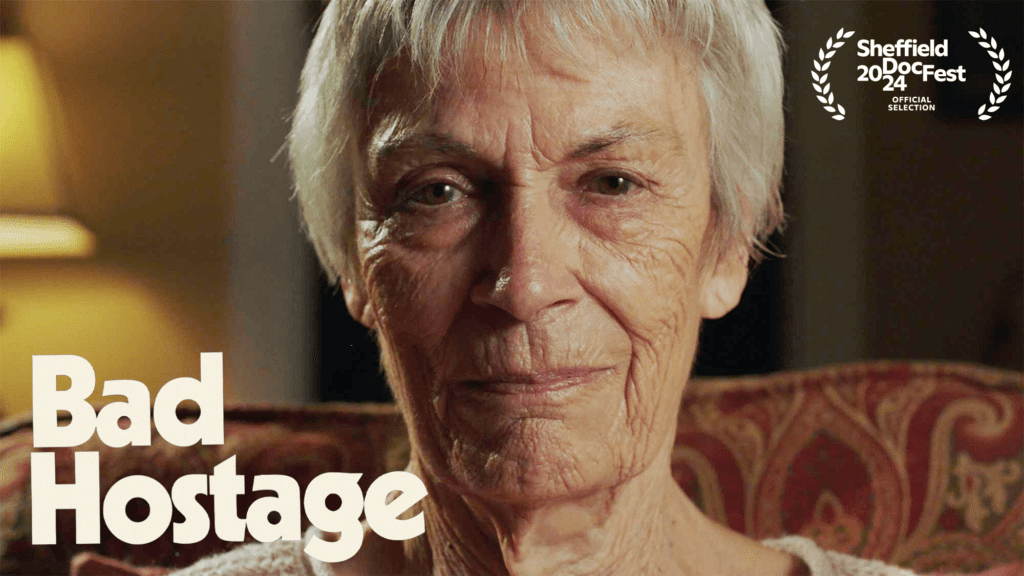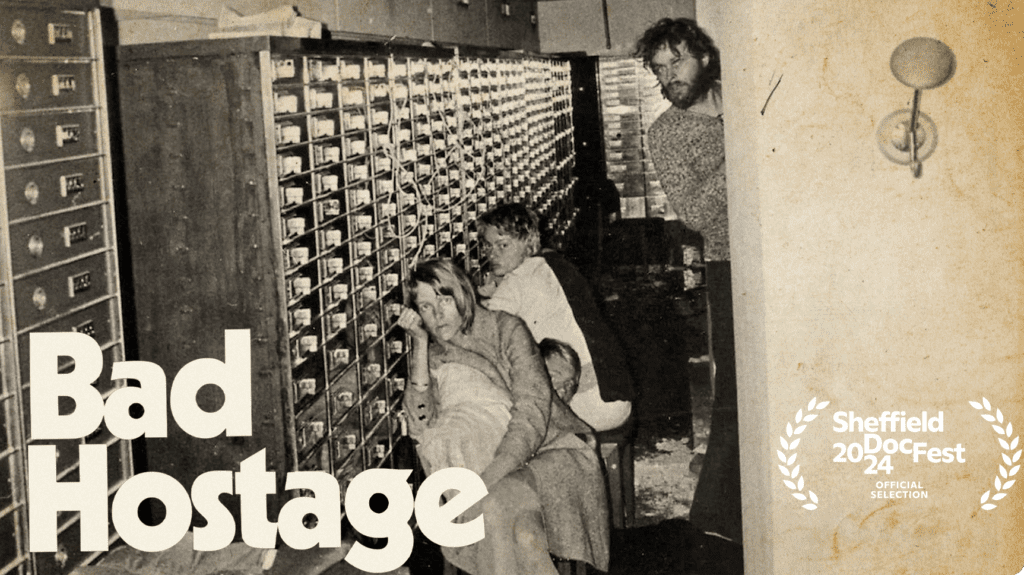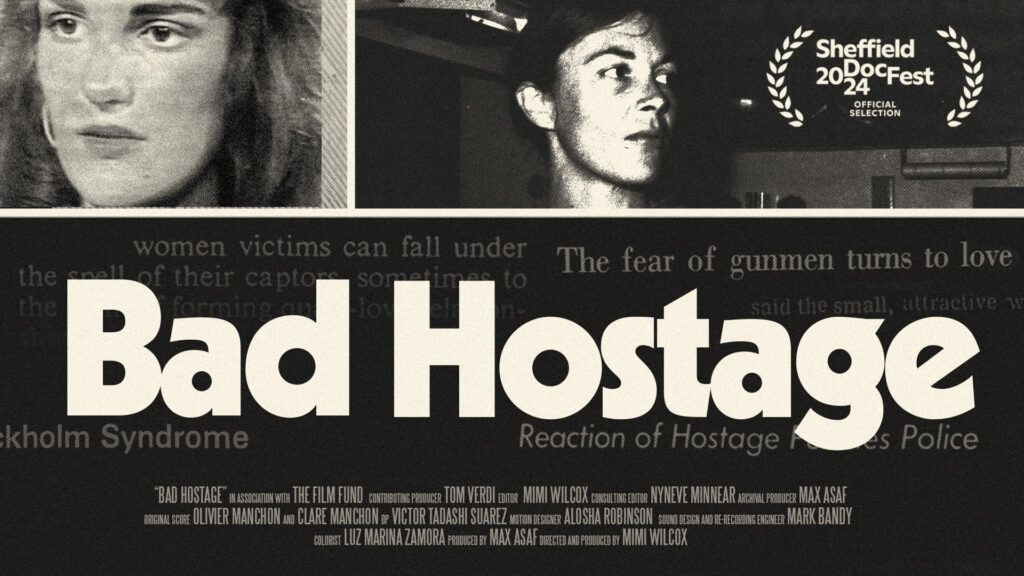“Bad Hostage”: A New Documentary Premiering at Sheffield DocFest 2024
The Film Fund is proud to spotlight “Bad Hostage,” a short film on Stockholm Syndrome directed by Mimi Wilcox and produced by Max Asef, made possible through Mimi’s winnings from our film funding contest! The movie is set to make its world premiere on June 13th as an Official Selection of Sheffield DocFest 2024, the United Kingdom’s largest documentary festival and the third largest documentary festival worldwide. This electrifying documentary promises to captivate audiences with its gripping narrative and thought-provoking look into Stockholm Syndrome from the perspectives of those held captive.
“Bad Hostage” is a documentary that delves deep into the harrowing experiences of three women who were held hostage in the 1970s. These women’s stories, told with raw honesty, reveal a startling truth: they felt more threatened by the actions of the police than by their captors. This shocking revelation forms the core of the documentary, inviting viewers to question the established narratives surrounding hostage situations and the psychological phenomenon known as Stockholm Syndrome. Our blog will explain this film’s inspiration as well as why you’ll wanna catch this film, so stay tuned!
The Film’s Origin

The Director’s Family Background
The movie takes direct inspiration from the family history of its director, Mimi Wilcox. Specifically, the encounter her family had with two armed captors. Wilcox said, “Since I was a child, my mom has told me the story of how she, her four siblings, and her mother – my grandmother – were held hostage by two gunmen in the 1970s. I was always thrilled to hear about the immense yet gentle power of my grandmother who, as a single mother of five young children, had bravely de-escalated the conflict by choosing to see the humanity in others. I was also struck by the severity of the backlash my grandmother faced from her community, and especially from the police.”
The Stories of Famous Captives
While the family history was a big inspiration, the film dives into the famous stories of other women who were kidnapped. Women like Kristen Enmark and Patricia Hearst who made the term “Stockholm Syndrome” a part of the English vernacular. Wilcox explained, “Over the years, Bad Hostage grew to become a very personal criticism of the ways in which institutions (from law enforcement to media) insidiously silence women who criticize them… Exploring these stories gave me a deep appreciation for the simple power of listening to the experiences of women rather than allowing institutional narratives to be applied to them. And, crucially, it gave me a framework for imagining a different kind of world, one my grandmother fought to live in with her actions that night 50 years ago.”
Stockholm Syndrome

What is it?
Stockholm Syndrome is a psychological phenomenon where hostages develop emotional bonds and sympathy towards their captors. The term originated from a 1973 bank robbery in Stockholm, Sweden, where hostages famously defended their captors and even refused to testify against them in court. The counterintuitive reaction to this syndrome can be baffling to outsiders, but as “Bad Hostage” will show, there is more to it than meets the eye.
Impact on Captives
“Bad Hostage” offers a fresh exploration of the victims’ point of view in these situations, revealing how these intense experiences involving hostages and captors were manipulated and worsened by the actions of those we’re led to trust, like law enforcement. Instead of finding solace in the authorities, these women faced additional layers of fear and confusion. “Bad Hostage” emphasizes that the hostages’ identification with their captors wasn’t a sign of weakness but a sign of compassion and a testament to the power de-escalation and of listening.
Why Should You Watch “Bad Hostage”?

A New Perspective on Hostage Scenarios
Most people tend to see those who humanize with their captors and turn away law enforcement as being seduced or enraptured by their captors. They are characterized as being brainwashed or manipulated into thinking illogically. Very rarely do we get to hear from the captives themselves and why they acted the way they did. This film on Stockholm Syndrome aims to give a voice to these women and expose the way that society enforces its own narrative.
Recognition for “Bad Hostage” and Mimi Wilcox
While the movie has not had its world premiere yet, “Bad Hostage” already has a lot to show. As stated initially, the film is honored to be an official selection of Sheffield DocFest, a highly prestigious documentary festival. And director Mimi Wilcox herself is an American Cinema Editors Eddie award-winner, which is a big deal. This is all to say that the movie has a lot of promise riding on it, which is a good reason you should check out the movie if you have the chance.
In Conclusion
As we anticipate the world premiere of “Bad Hostage” at Sheffield DocFest 2024 as a part of the program “Shorts: Truth to Power” on June 13th, there’s much to be excited about. This gripping film on Stockholm Syndrome by acclaimed Chicago-based filmmaker Mimi Wilcox promises to take us on a riveting journey through the harrowing experiences of three women held hostage in the 1970s. Through their stories, we are invited to challenge our understanding of kidnappings and consider the unsettling role of the police in these cases.
It’s films like “Bad Hostage” that really make us at The Flim Fund thrilled about the power of filmmaking and the stories that people want to share with the world. We can’t wait to see what Mimi and her team accomplish in the future. And if this story and the work of these filmmakers have inspired you, enter our short film funding contest like Mimi did! By winning, you could earn up to $10,000 in funding for your short film. Unlike most other funding avenues, we don’t ask for a full script. We ask for one sentence that explains the premise of your short film, narrative or documentary, and why you need our help. Head to our entry page to learn more and enter!